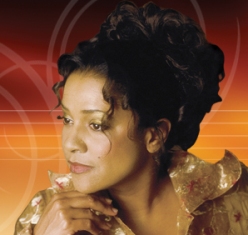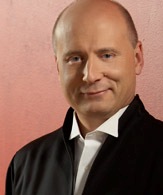
Järvi, Battle Open Cincinnati Symphony Season
Thursday evening’s opening concert by the Cincinnati Symphony
Orchestra at Music Hall was about comings and goings and what Cincinnati does best, embracing
its own.

Guest artist was Portsmouth, Ohio native and University of
Cincinnati College-Conservatory of Music graduate Kathleen Battle in a homecoming
appearance, only her second appearance at Music Hall since she was dismissed by the Metropolitan Opera in 1994,
citing “unprofessional conduct." (She sang arias by Handel at the 1998 May Festival.)
Make no mistake. Kathleen Battle is a consummate artist. What her demons are or may have been should be left behind. What she demonstrated in songs by Richard Strauss, and even more so in Rosina’s aria Una voce poco fa from Rossini’s “Barber of Seville,” was that she has much to offer from her wealth of professional and personal experience.
Battle was the headliner
for the event, which also just happened to be the opening concert of Paavo Järvi’s final season as CSO music
director. It was hard to tell. Banners in the lobby were mere splotches of color
with the orchestra’s current slogan, “where passion comes to play,” splayed
across them. There was no likeness of Järvi on the banners or even the program
book, which did, however, read “paavo10” in pale letters. This is a far cry from the “Bravo Paavo”
posters that plastered the town when he arrived nine years ago.

Be that as it may, there was great music to be had, all by Richard Strauss, including "Also sprach Zarathustra" ("Thus Spake Zarathustra") and the Suite from his opera "Der Rosenkavalier" ("The Knight of the Rose"). A decent crowd was on hand to enjoy it (guesstimate, circa 1,900) and they obviously did, lining up outside the green room after the performance for autographs of the artists. Saturday’s repeat at 8 p.m. at Music Hall will more likely be full, since it is also a gala fund raiser, with a big party to go with it.
Järvi opened with the ultimate crowd-pleaser, “Also sprach Zarathustra." (At least the first 90 seconds of it is a crowd-pleaser. The rest of it takes a bit more exposure.) This tone poem about the ancient Persian prophet Zoroaster (Zarathustra) is famous for its soaring, “sunrise,” introduction, used in Stanley Kubrick’s film “2001,” based on Sir Arthur Clarke’s futuristic novel. It was quite handsomely performed by the CSO forces, with gleaming brass and strokes of timpani applied with strength and grandeur by principal timpanist Patrick Schleker. The lack of a fine organ in Music Hall was a minus. The hall's original pipe organ was allowed to deteriorate and was finally trashed during the 1970s, but blame that on an earlier generation. CSO keyboardist Michael Chertock attended the newer electronic model nicely.
"Zarathustra” is a complex 30-minute work, with plenty of baggage to go with it, i.e. Nietzsche, Adolph Hitler, the Übermensch (or “Superman,” not to be confused with Clark Kent). Jonathan Kramer’s program note helps put that in perspective, explaining that Kubrick’s choice of Strauss’ theme for his film was appropriate musically, and even philosophically, since it deals with a journey into a puzzling future. Strauss himself seems to have had doubts about Nietzche’s Superman, for if you listen to the work carefully, it ends unresolved, with two keys clashing against each another (man vs. nature, listen to the double basses).
The CSO played with all the beauty and assurance that Järvi customarily brings to the orchestra. It was like having a master at the wheel again, as he drew lush, bass-rich sonorities from the strings, and highlighted details in the score that often get under-played (muted comments by the horn, for example). Though it is scored for a huge orchestra, “Zarathustra” is really chamber music writ large, with the strings divided into multiple parts and leitmotifs laced tellingly throughout. Concertmaster Timothy Lees shone in his important solos, particularly near the end, as the music became more ecstatic. (Strauss over-wrote this, it would seem, and “with humor” is written into the score earlier, when the clarinet quotes a sassy theme from Strauss’ “Till Eulenspiegel’s Merry Pranks.”)
Kathleen Battle kept the Strauss coming after intermission, with
four of his songs for soprano and orchestra, “Ich wollt’ ein Sträusslein binden” (“I would have made a
bouquet”), “Wiegenlied” (“Lullaby”), “Muttertändelei” (“Mother-chatter”) and “An
die Nacht” (“To the Night”). She opened with
the Rossini, where she demonstrated precise runs, real trills and high notes of
the sort to be envied by a singer of any age (she turned 62 in August). She projected the kittenish aspect of the
role beautifully – Rosina touts her feminine wiles in the aria – throwing
her head back characteristically to help project the sound. And therein lay the problem.
Battle was always known for the “ping” in her voice, which though small and silver-sweet, could cut through an orchestra. No more. It is still beautiful, but can no longer pull off that feat. There were times when the CSO covered her up, despite Järvi’s sensitive, pinpoint accompaniment and attempts not to let it get too heavy. This extended to the Strauss songs, where the orchestra is meant to play an equal role with the voice. Battle’s expressiveness and dramatic skill were there in spades, and her stage presence was as formidable as ever – she was dressed regally in a strapless black gown, with a transparent raspberry over-wrap. But “Wiegenlied” was almost inaudible in Music Hall -- granted that the hall is too big for symphony concerts anyway -- and its generally flattering acoustics did not avail.
Battle seemed to be saving her voice for the final two songs, “Muttertändelei” and “An die Nacht,” where she got her message across better. “Muttertändelei,” about a mother’s delight in her child, was charming. Audience reception was warm and proud, listeners rising to their feet in a unanimous, heartfelt ovation. She rewarded them with Strauss’ lovely “Morgen” (“Morning”).
The energy Järvi put into “Zarathustra” was even more evident in the “Rosenkavalier” Suite. The CSO played with virtuosity, following his lead with their customary commitment and skill. It was a “hot” interpretation, full of schmaltz and propulsion, even irony as the dizzying waltzes kept coming. It was sweetly tender in “The Presentation of the Rose” from act II, where Octavian delivers a silver rose to Sophie on behalf of Baron Ochs (she and Octavian fall in love and Ochs is gored). The famous “silver chords” for flutes, violins, harp and celesta hung exquisitely in the air, and principal oboist Dwight Parry put lots of heart into his solos. The CSO crowd “got it” completely and gave Järvi and the orchestra a cheering, standing ovation, evidence that they are sorry to be losing him.
Note: Effectively, Järvi
left the CSO last season, when he led 12 of the 23 subscription concerts at Music
Hall. He leads eight of this season’s 20
Music Hall concerts, plus a farewell gala with cellist Yo Yo Ma in May. Järvi,
47, became music director of France’s Orchestre de Paris in September and heads
the Frankfurt Radio Orchestra and Deutsche Kammerphilharmonie Bremen, as well. He records with all of these orchestras and
was just named Conductor of the Year by the German recording academy, equivalent of the American Grammys. The CSO no longer
records, having canceled their last recording with Järvi last spring. (This was done for budgetary reasons, as well as the demise of the Telarc label. Plans are in the works for the CSO to create its own label and to release a compilation disc -- taken from concert performances at Music Hall -- of some of the new American music premiered or performed by Järvi and the CSO during his time in Cincinnati.)
All of the above activities easily make Paavo Järvi one of the world’s busiest conductors. Still, it may not be too late for the CSO – and the city – to demonstrate that his train has not yet left the station.
Tickets for Saturday’s repeat (October 2) are $10-$56.25, available by calling (513) 381-3300, or visit the CSO web site at www.cincinnatisymphony.org